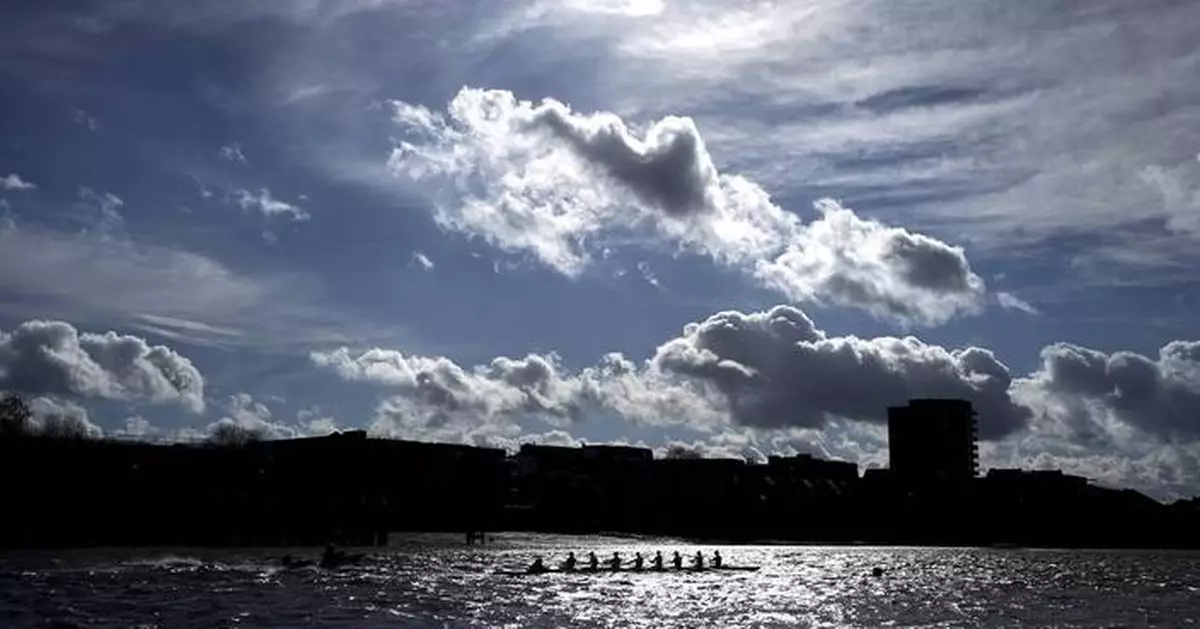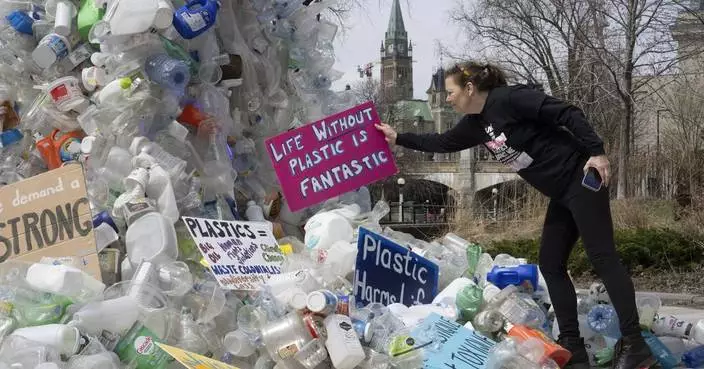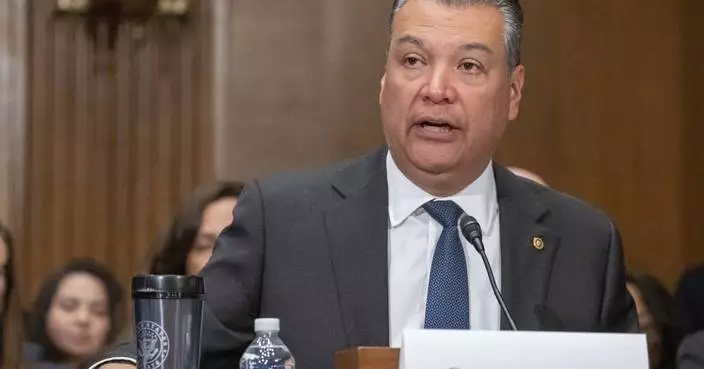LONDON (AP) — The coach of Oxford’s crew taking part in the Boat Race described the pollution in London’s River Thames as a “national disgrace” as the company responsible for its upkeep faces mounting financial difficulties that critics say will need it to be taken back into state hands.
Testing by a campaign group has found high levels of E.coli along a section of the Thames in southwest London that will be used for the historic race on Saturday.
Crew members have been warned about the risks of entering the water and advised to use a “cleansing station” at the finish area. The pollution has also cast doubt on the post-race tradition of throwing the winning cox into the water.
It comes as figures released by the Environment Agency showed the level of sewage spills into England’s rivers and seas by water companies more than doubled in 2023 compared to 2022, reaching 3.6 million hours of spills in 2023 compared to 1.75 million hours in 2022.
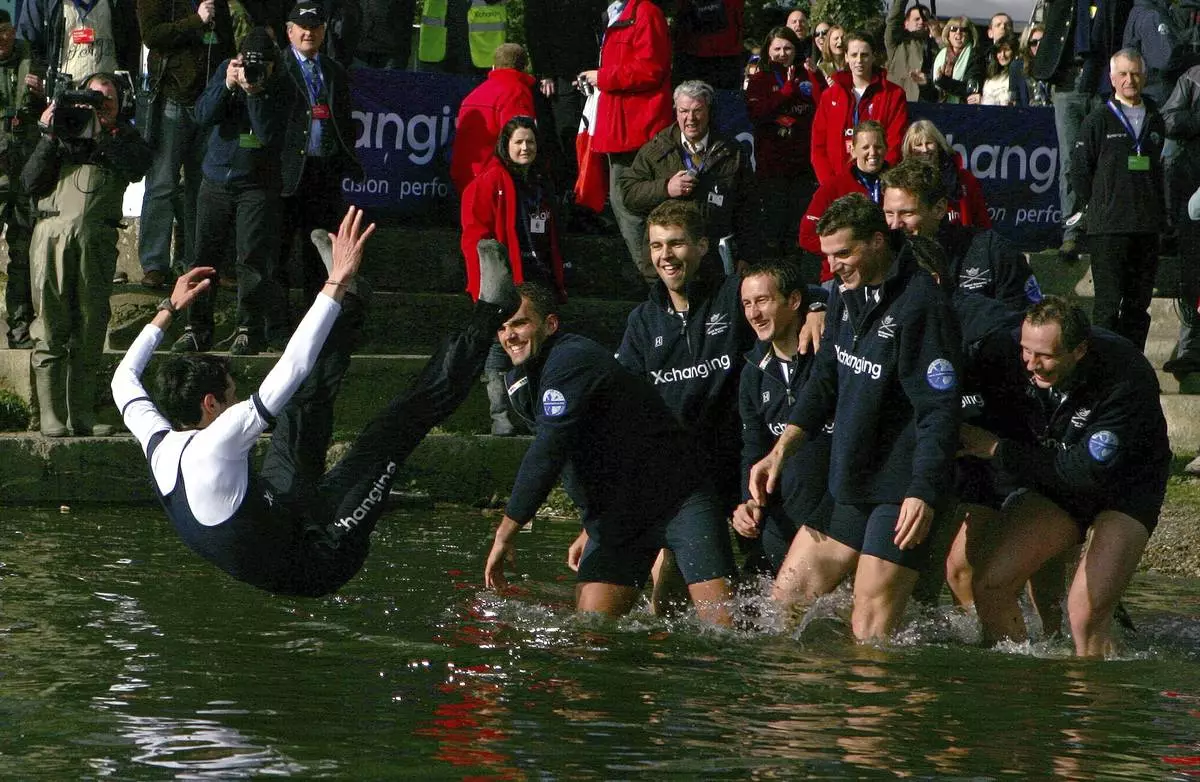
FILE - The Oxford crew, right, throw their cox Colin Groshong into the Thames at the 155th Boat Race, in London, Sunday March 29, 2009. Jumping into London’s River Thames has been the customary celebration for members of the winning crew in the annual Boat Race between storied English universities Oxford and Cambridge. Now researchers say it comes with a health warning. (AP Photo/Tom Hevezi, File)
There has been no suggestion that the annual Boat Race between storied universities Oxford and Cambridge that dates to 1829 will not go ahead. The women's race will precede the men's event along the same 4.2-mile (6.8-kilometer) section of the Thames.
But Oxford coach Sean Bowden has lamented the state of the water.
“It’s a national disgrace, isn’t it?” Bowden posed. “It would be terrific if the Boat Race drew attention to it. We are very keen to play a part and we recognize we have a role and a responsibility to it.
“Why,” he added in British newspaper The Daily Telegraph, “would you want to put your kids out in that?”
Invariably, the focus has turned to whether the winning crew will dunk its cox into the Thames at the end of the race.
“If there’s a health and safety problem, I don’t think we’ll be throwing him in because we don’t want to risk that,” said Harry Glenister, who has rowed for Britain and will compete for Oxford.
“It’s just too much of a risk. We support whatever the Boat Race is saying about the conditions in the water. We just hope we’ll win and then we’ll decide.”
Cambridge has won four of the last five men’s races and leads the rivalry 86-81.
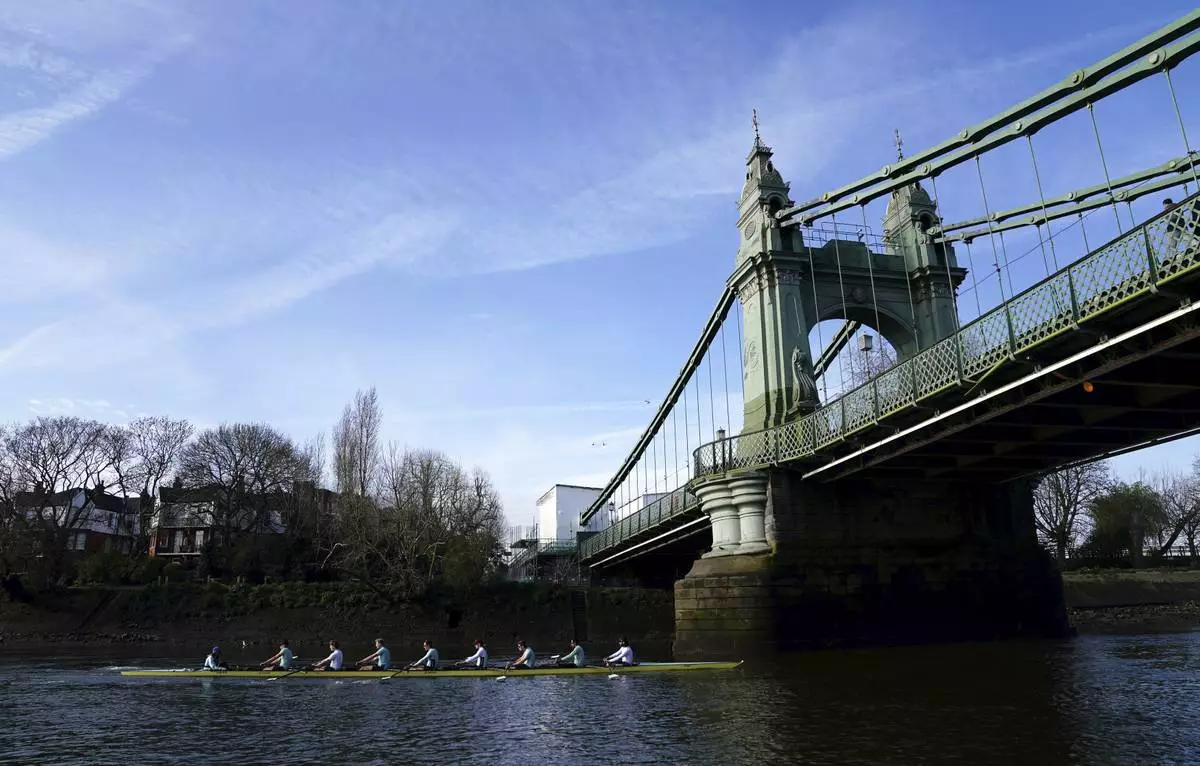
The Cambridge men's team pass under Hammersmith Bridge during a training session on the River Thames in London, Tuesday March 26, 2024. Jumping into London’s River Thames has been the customary celebration for members of the winning crew in the annual Boat Race between storied English universities Oxford and Cambridge. Now researchers say it comes with a health warning.(John Walton/PA via AP)
Cambridge has also won six straight in the women’s race.
E.coli bacteria normally live in the intestines of healthy people and animals. Most strains are harmless, cause relatively brief diarrhea and most people recover without much incident, according to the Mayo clinic. But small doses of some strains — including just a mouthful of contaminated water — can cause a range of conditions, including urinary tract infection, cystitis, intestinal infection and vomiting, with the worst cases leading to life-threatening blood poisoning.
River Action, a campaign group, said the testing locations suggested the source of pollution was from utility company Thames Water discharging sewage directly into the river and its tributaries. Thames Water, Britain’s largest water company, is facing huge pressure to clear up the river, though it insists that the elevated levels of E.coli are not necessarily its fault.
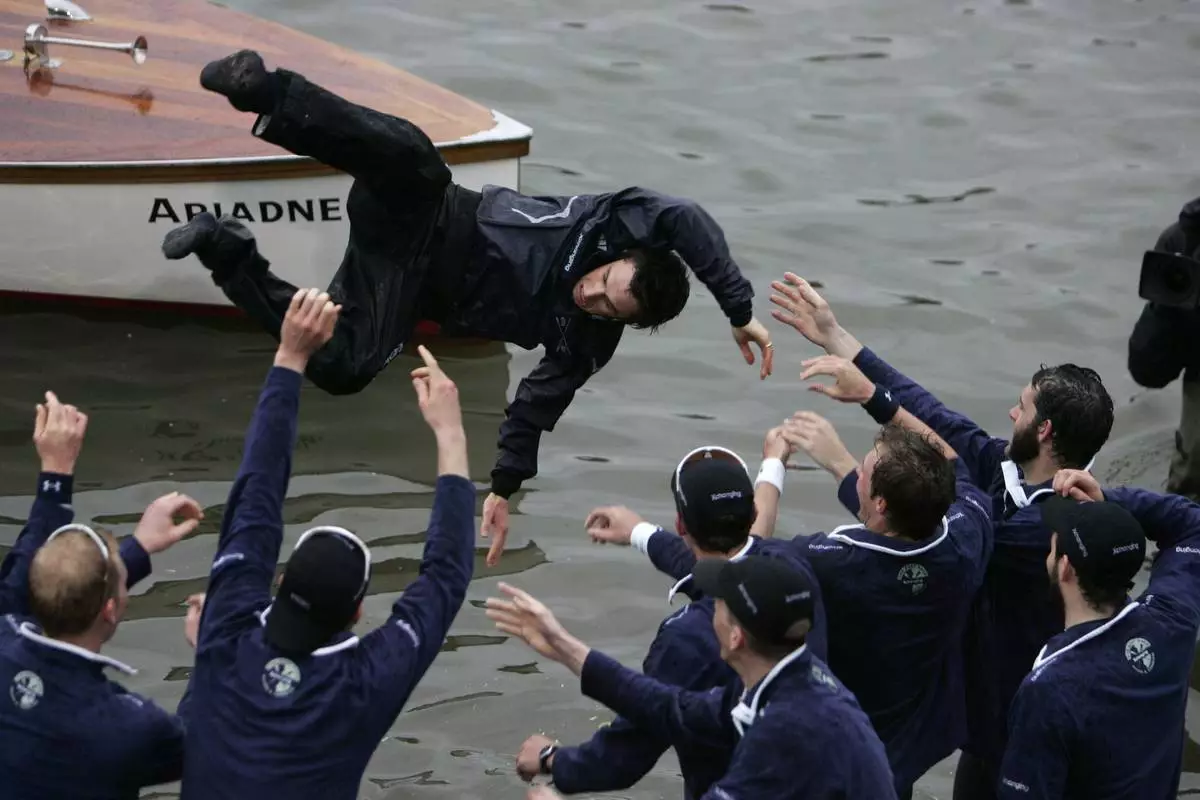
FILE - Members of the Oxford University rowing team throw their cox Nicholas Brodie, centre, into the river after beating Cambridge University, at the 154th annual Boat Race on the River Thames, London, Saturday, March 29, 2008. Jumping into London’s River Thames has been the customary celebration for members of the winning crew in the annual Boat Race between storied English universities Oxford and Cambridge. Now researchers say it comes with a health warning. (AP Photo/Lefteris Pitarakis, File)
“I would point out that E.coli has many different sources,” the company's recently appointed chief executive Chris Weston told the BBC. “It is not just from sewage, it is also from land run-off, it is from highway run-off, it is from animal feces. All of those things contribute to the problem and I am absolutely determined that at Thames, we will play our part in cleaning up the problem and so the Thames is a river that people can use as they would like to everyday.”
Under a plan drawn up last summer, Thames Water was asking investors to inject close to 4 billion pounds ($5.05 billion) into the business over the next five years. However, on Thursday shareholders refused to make the first payment of 500 million pounds ($630 million) without a big increase in consumers’ water bills, a demand that the industry regulator denied.
Weston insisted that it was “business as usual” at the debt-laden company as it has enough financial resources to survive into next year, by which time he hoped a new funding arrangement will have been agreed. However, the news has raised speculation that the company may have to be nationalized.
The parlous state of many of Britain's rivers, canals and coastlines is set to feature heavily in the general election, which is expected to take place in the next few months. The main opposition Labour Party, which is way ahead of the governing Conservatives in opinion polls, has said it will make sure that “new investment comes through to fix the broken sewage system without taxpayers being left to foot the bill."
AP sports: https://apnews.com/sports
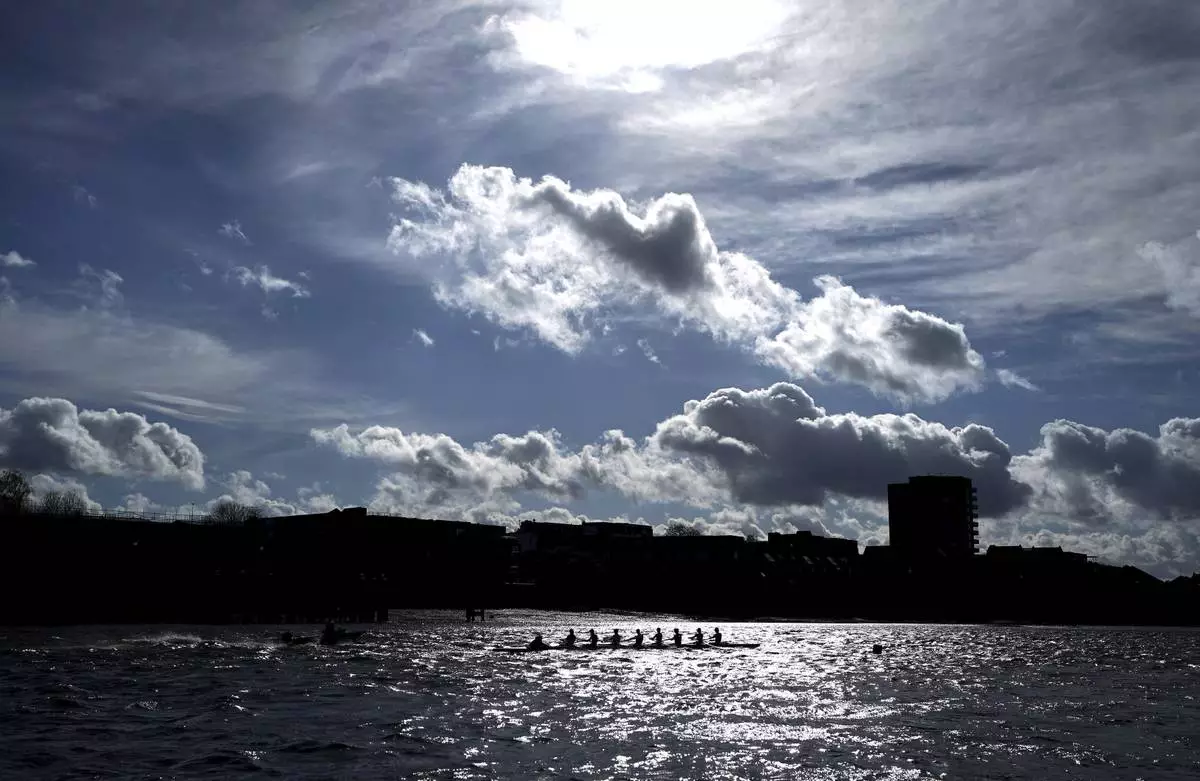
The Cambridge Men's team during a training session on the River Thames in Putney, London, Wednesday March 27, 2024. Jumping into London’s River Thames has been the customary celebration for members of the winning crew in the annual Boat Race between storied English universities Oxford and Cambridge. Now researchers say it comes with a health warning. (Zac Goodwin/PA via AP)
OTTAWA, Ontario (AP) — Nations finished a round of negotiations early Tuesday on a treaty to end plastic pollution and made more progress than they have in three prior meetings.
Coming into Ottawa, many feared the effort would stall to craft the first legally binding treaty on plastics pollution, including in the oceans. The last meeting was marred by disagreements and there was much left to do.
But instead, there has been a “monumental change in the tone and in the energy," said Julie Dabrusin, a Canadian parliamentary secretary.
It was the fourth Intergovernmental Negotiating Committee on Plastic Pollution session. For the first time, the nations began negotiating over the text of what is supposed to become a global treaty. They agreed to keep working between now and the next and final committee meeting this fall in South Korea.
“We are working toward a world where we won’t have plastic litter everywhere in our ecosystems," Jyoti Mathur-Filipp, the executive secretary of the committee, said in an interview. “The energy is there, the will is there and I know we will get an instrument by the end of the year."
Here are some of the biggest takeaways from the meeting:
The talk shifted in Ottawa from sharing ideas to negotiating treaty language. Finally, said Santos Virgílio, Angola’s chief negotiator. Time was wasted in previous meetings, Virgílio said, but this time many arguments had been exhausted and it was time to find solutions.
“It’s big, because we have been going round and round during these sessions without showing direction,” he said in an interview. “But at least now, people are showing, OK, they have goodwill.”
Most contentious is the idea of limiting how much plastic is manufactured globally. Currently, that remains in the text over the strong objections of plastic-producing countries and companies and oil and gas exporters. Most plastic is made from fossil fuels and chemicals.
Graham Forbes, head of the Greenpeace delegation in Ottawa, said massively reducing plastic production is the most important thing the treaty can do because it's impossible to end plastic pollution otherwise.
Plastic production continues to ramp up globally and is projected to double or triple by 2050 if nothing changes. Plastic producers and chemical companies want a treaty that focuses on recycling plastic and reuse, sometimes referred to as “circularity.”
The negotiators agreed to keep working on the treaty in the coming months. Expert working groups will collect information and expertise to inform the negotiations at the final meeting in South Korea in the fall.
Without this preparation work between meetings, it would've been daunting to complete the negotiations this year.
The topics they’ll work on in between sessions are one indication of their priorities for the final round of talks. Plastic production won't be a focus for the working groups. Instead they will focus on how to finance the implementation of the treaty, assess the chemicals of concern in plastic products and look at how products are designed.
Environmental groups were frustrated that production cuts won't be part of the work between now and the fall meeting.
Waste pickers have been on the frontlines of trying to solve plastic pollution for decades, said John Chweya, a 33-year-old waste picker representing Kenyan waste pickers.
They collect, sort, recycle and sell plastics that would otherwise pile up or be burned. They're exposed to hazardous materials and can suffer from respiratory illnesses, skin infections and other diseases. They want a treaty that recognizes the role they play and helps waste pickers transition to safer jobs.
“We’ve given this problem that this treaty is trying to solve our lives," Chweya said.
In Malawi, Tiwonge Mzumara-Gawa sees plastic bags littering the lands where goats and cows graze and people burning waste behind their homes because there is no waste collection. She believes it'll take a global agreement for the national government to do more to address plastic pollution. Mzumara-Gawa is a campaigner for the Christian charity Tearfund.
Frankie Orona told negotiators their decisions affect peoples' lives and health. Indigenous land, water and air are being contaminated as fossil fuels are extracted and plastic is manufactured using hazardous chemicals, said Orona, executive director of the Texas-based Society of Native Nations.
“We're here to make sure our voices are being heard,” he said. “Our communities have been disproportionately impacted for decades, Indigenous and black and brown communities.”
They plan to finish negotiating in South Korea so the treaty can be adopted next year at a diplomatic conference. It’s an extremely short timeline for negotiations, meant to match the urgency of the problem.
Dabrusin, of Canada, said she's more hopeful than ever that an ambitious treaty to end plastic pollution will be adopted on schedule. Over the past week, she said she has heard from so many people that this is what they want — from businesses and environmental advocates to waste pickers and residents of communities littered with plastic.
“We're hearing many voices coming together,” she said. “That’s a beautiful moment when you can see that synergy, that it’s economic, it's environmental, it’s for health reasons. And there is that momentum right now.”
The Associated Press’ climate and environmental coverage receives financial support from multiple private foundations. AP is solely responsible for all content. Find AP’s standards for working with philanthropies, a list of supporters and funded coverage areas at AP.org.
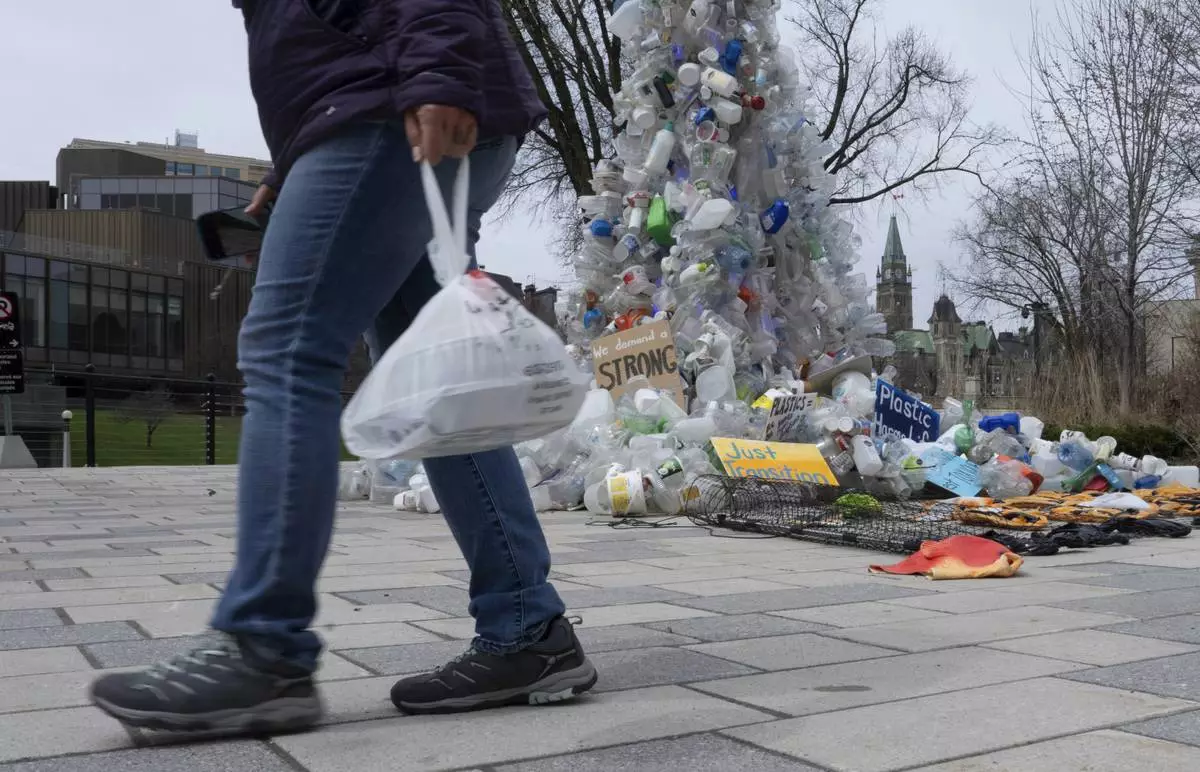
FILE - A person carries food in a plastic bag past an art installation outside the a United Nations conference on plastics on April 23, 2024, in Ottawa, Ontario. (Adrian Wyld/The Canadian Press via AP, File)

FILE - Minister of Environment and Climate Change Steven Guilbeault leaves a news conference at the Intergovernmental Negotiating Committee with staff, April 23, 2024, in Ottawa, Ontario. (Adrian Wyld/The Canadian Press via AP, File)
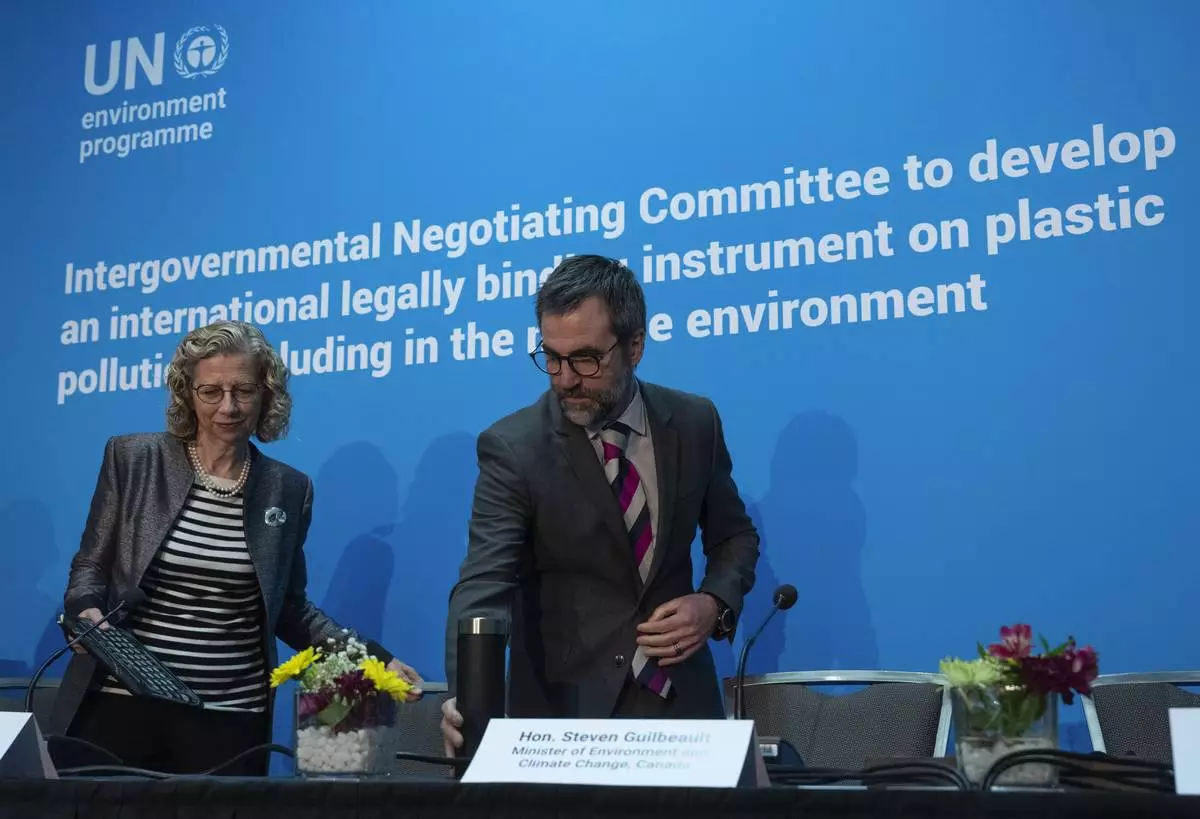
FILE - United Nations Environment Programme Executive Director Inger Andersen and Environment and Climate Change Minister Steven Guilbeault take their seats at a news conference April 23, 2024 in Ottawa, Ontario. (Adrian Wyld/The Canadian Press via AP, File)
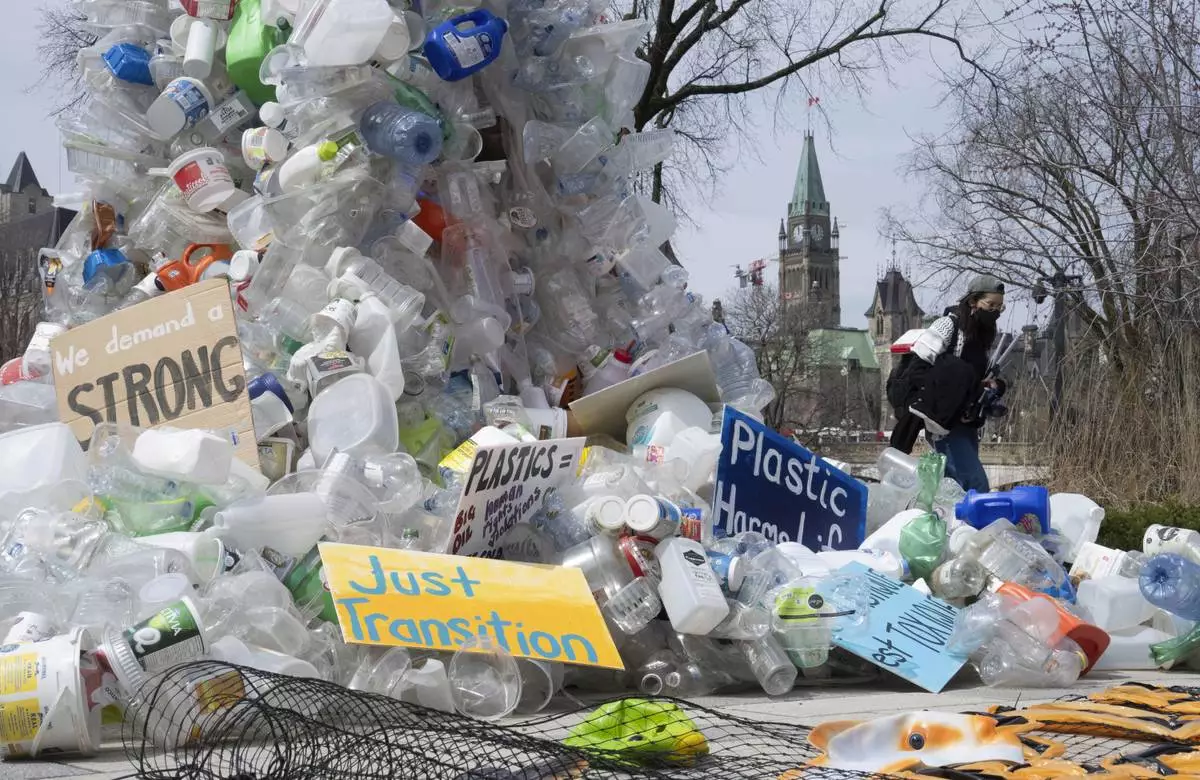
FILE - A person walks past an art installation outside a United Nations conference on plastics on April 23, 2024, in Ottawa, Ontario. (Adrian Wyld/The Canadian Press via AP, File)






